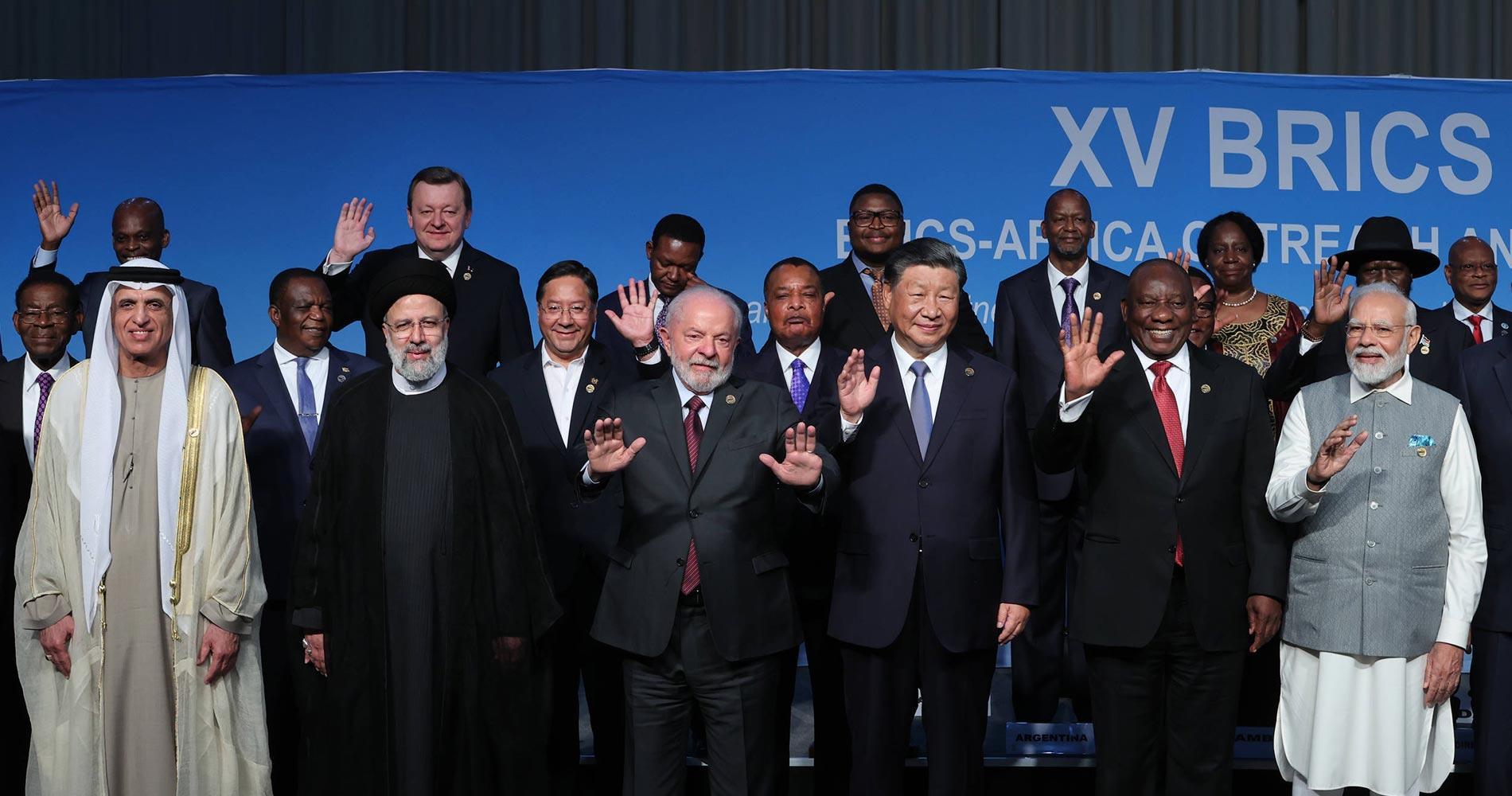The BRICS expansion could reshape world politics. Four key countries from the MENA (Middle East and North Africa) region, Egypt, Iran, Saudi Arabia, and the UAE, have been newly admitted to the BRICS group. In addition to the recent Iran-Saudi rapprochement, this move is considered “a strategic victory for Iran’s foreign policy” following years of Western sanctions and pressure. This expansion is also set to enhance the influence of the Middle East in global affairs and improve regional stability. Further, BRICS is now considered an energy giant, representing some of the world’s largest oil producers and consumers. Can these new partnerships balance Western dominance?
Aly Mahmoud
31 October 2023
Arabic version | French version | German version
During the recent BRICS summit, held on 22-24 August 2023 in Johannesburg, South African, President Cyril Ramaphosa, Chairman of the summit, announced the admission of six new countries in the group starting January 2024: Argentina, Egypt, Ethiopia, Iran, Saudi Arabia, and the United Arab Emirates. Notably, four of these countries are in the MENA region. After this recent expansion, the BRICS group comprises 11 members, also referred to as BRICS+.
Representing more than 45% of the world population, more than 30% of the global GDP, and more than 32% of the world land area, the BRICS group is now considered one of the most critical geopolitical blocs that challenge Western dominance, especially after the recent expansion which increased the group representation and diversity by including important emerging and developing countries.
For the MENA region, the new members are expected to have more influence in global matters and take on more significant leadership roles at the regional and global levels. Areas such as energy security, natural resources, investment opportunities and increased political influence within global international organizations, such as the United Nations are expected. However, in light of the ongoing Israel-Palestinian conflict, BRICS+ influence will be tested on a geopolitical level.
BRICS+ is also predicted to play a key role in strengthening regional stability and security, which had been increasing steadily since the end of 2021, as shown by the reinstatement of the UAE ambassador in Tehran in August 2022 and Saudi Arabia and Iran resuming diplomatic ties in March 2023 through China’s skillful mediation.
These strategic moves also signify the determined efforts of the BRICS+ countries to diversify economic ties and to reduce their financial, economic, and even political dependence on Western nations, especially on the United States. It also enhances their access to a strong network of economic partners, considering the ongoing global transformations that the world is witnessing amid geopolitical transformations.
Egypt is expected to benefit especially, as the volume of trade with BRICS already exceeds USD 31 billion, giving more options from dependence on the USD by expanding its commercial transactions in local currencies. Correspondingly, this has the potential to reduce the demand for foreign currencies and save its reserves, which is particularly important for Egypt considering its acute shortage of foreign currency. However, Egypt now has a more reliable alternative to the Western lending mechanisms including the World Bank, namely the BRICS New Development Bank. Since its inception, this bank has approved around 80 projects for all its members with a total investment of USD 30 billion and offers additional liquidity and other benefits to BRICS members when needed.
Iran has considered its joining BRICS as a “political victory” after facing years of Western sanctions and isolation, which considerably hindered its ability to connect with the global financial system and access fundamental foreign investments. Particularly with regard to the oil and gas sectors, Iran was forced to sell oil and gas on the black market at substantial discounts and losses. BRICS+ membership could give Iran more room to maneuver diplomatically and enable it to start breaking free from the Western-imposed diplomatic and economic isolation. BRICS+ can create for Iran economic relations that bypass the US-led global financial system, particularly if the Iranian government could sell oil at its desired volume to BRICS+ members and allow it to properly invest in the exploration and development of Iran’s oil reserves. Nevertheless, without the lifting of the imposed sanctions, enjoying the full advantages of BRICS will be challenging, as private or state enterprises will likely be hesitant to invest in Iran and jeopardize their operations in the West.
The original BRICS members will also benefit from the recent expansion. The Middle East is considered the most energy-rich region in the world. The proven reserves of oil and natural gas in the four newly admitted countries from the MENA region represent 34% of the global oil reserves and 27% of the global gas reserves. In addition, BRICS+ will now account for over 40% of the world’s oil output compared to only 20% in 2022.
Considering that BRICS already includes China and India, the world’s first and third largest crude oil importers, this will have clear geopolitical implications. Notably, BRICS+ will have access to vital waterways for energy transport, including the Persian Gulf, the Red Sea, and the Mediterranean. Since the recent Western sanctions against Russia and Iran, including freezing state assets and reserves and banning oil and gas imports, countries are exploring ways to guard themselves against such risks, and the BRICS+ group could provide a means of ensuring energy security. Russia and Iran are already settling their oil trade payments with the Chinese yuan, and the UAE has reportedly sold oil to India with payments in Indian rupees. Over time, this could lead to a multi-currency global system that challenges the existing USD-dominated oil market.
BRICS+ has increased the influence of MENA countries, but its future as a geopolitical bloc will largely depend on how its members deal with conflicts and if agreements can be reached. Finding solutions to key issues will be challenging given that group decisions are based on consensus, which could be challenging due to the members varied and often opposing interests and values. Key issues to be dealt with include: the border conflict between China and India will develop; Egypt-Ethiopia conflict over the GERD (Grand Ethiopian Renaissance Dam); Iran-Saudi Arabia relations and their long-standing religious and regional struggles; and finally, and most urgently, ending the Israel-Hamas conflict and restoring peace to the Middle East.







